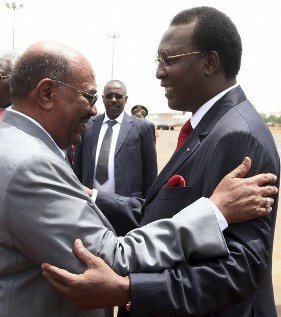Sudan’s Bashir to visit Chad on Sunday: report
August 5, 2011 (KHARTOUM) – The Sudanese president Omer Hassan al-Bashir will fly to Ndjamena on Sunday to attend the swearing-in ceremony of Chadian leader Idriss Deby for a new five-year term.

The independent Al-Sahafa newspaper published in Khartoum quoted informed sources as saying that Bashir will lead Sudan’s delegation to the inauguration ceremony.
This would be Bashir’s second visit to his western neighbor since the International Criminal Court (ICC) issued an arrest warrant for him on ten counts of war crimes, crimes against humanity and genocide he allegedly orchestrated in Darfur.
Chad is a signatory to the ICC’s founding treaty which means that it is theoretically obligated to arrest him.
Deby had initially vowed to enforce the arrest warrant and rejected African Union (AU) resolutions instructing its members not to apprehend Bashir.
However as thorny relations between the two countries dramatically improved, Deby allowed Bashir to visit in July of last year. The Chadian government then referred to the AU decision to justify receiving the Sudanese president and dismissed criticism by rights groups.
The AU summit held in June cleared Chad, Djibouti and Kenya from any wrongdoing in receiving Bashir saying they were conforming to the pan-African body’s resolution in this regard.
ICC judges had reported the non-compliance of these member countries to the United Nations Security Council (UNSC) and the ICC assembly of state parties but no action was taken.
Several African countries have asked Bashir to stay away despite the AU resolution and threatened his arrest should he sets foot on their territories.
Bashir reportedly cancelled his appearance at the golden jubilee of Chad’s independence last January following international pressure.
The Hague tribunal has no police force and relies on state cooperation to enforce arrests warrants.
(ST)
